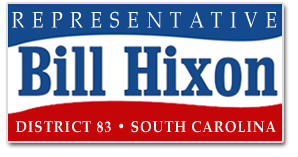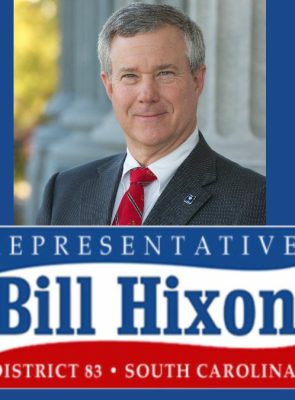Dear Friends,
I will continue on trying to get the trash picked up in our area. SCDOT will start back picking up trash again closer to this years Masters. I am continuing to work on getting the grass cut at the welcome center on I-20. I have been promised it will be looking great before this years Masters. This is the gateway to North Augusta, South Carolina. Please let me know if I can help you in anyway.
HOUSE WEEK IN REVIEW
The House of Representatives concurred in Senate amendments to H.3653, a bill imposing LIMITATIONS ON NUISANCE SUITS RELATED TO MANUFACTURING AND INDUSTRIAL USES OF REAL PROPERTY, and enrolled the legislation for ratification. Addressing situations where urban growth has prompted residential development to expand into previously outlying areas where established industrial facilities have been operating, the legislation imposes limitations on nuisance suits that nearby residents can bring against pre-existing industrial, manufacturing, transportation, and warehousing facilities that are complying with environmental permits and are otherwise operating lawfully. Affording legal protections like those already provided for agricultural operations, the legislation proposes to codify the common law defense of ‘coming to the nuisance’ as a means of promoting economic development.
The House amended, approved, and sent the Senate H.3529, a bill establishing the
GENERAL ASSEMBLY’S EXCLUSIVE AUTHORITY OVER THE REGULATION OF AUXILIARY CONTAINERS, such as plastic grocery bags, disposable cups, and takeout food boxes. This legislation provides that any regulation regarding the use, disposition, sale, or any imposition of any prohibition, restriction, fee imposition, or taxation of auxiliary containers must be done only by the General Assembly. This authority supersedes and preempts any local ordinance enacted by a political subdivision, but the legislation does not apply to auxiliary container regulations adopted before January 31, 2018, including regulations with a delayed implementation date or that are conditioned on future municipal action. A municipality located within a county that has adopted an ordinance before January 31, 2018, may pass the same or similar ordinance. The legislation does not impose limitations on county or municipal ordinances regulating solid waste disposal or recycling programs. The legislation does not apply to the use of auxiliary containers within the boundaries of a State park, on a property owned by a county or municipality, such as coastal tidelands and wetlands, or on a public beach, river, or other body of water maintained by a county or municipality.
The House approved S.297, a bill relating to PERFORMING SECURITY OFFICER DUTIES PENDING THE ISSUANCE OF A REGISTRATION CERTIFICATE, and enrolled the legislation for ratification. The legislation revises provisions relating to private security officer registration certificates issued by the State Law Enforcement Division, to provide that, pending issuance of a registration certificate, a security officer may perform professional duties for up to thirty days, rather than twenty days, after receipt by SLED of his application for registration.
The House returned S.185, a bill providing FUNERAL SERVICE CONSUMER PROTECTIONSthat address solicitations from remote, out-of-state companies, to the Senate with amendments. The legislation establishes provisions that target the practice of allowing or permitting an Internet service provider, unlicensed person, establishment, or entity to engage in the practice of funeral service, embalming, cremation, or conducting business as a funeral home, funeral establishment, crematory, or mortuary. Under the legislation, an advertisement must include the physical address of the funeral home, funeral establishment, mortuary, or crematory where the advertised services will be provided. The State Board of Funeral Service is charged with promulgating regulations establishing additional requirements for advertisements relating to providing funeral services, including Internet advertisements.
The House amended, approved, and sent the Senate H.4655, the
“SOUTH CAROLINA INSURANCE DATA SECURITY ACT”.The legislation establishes standards for data security and standards for the investigation of and notification to the Director of the Department of Insurance of a cyber security event that impacts insurance licensees.
The House approved and sent the Senate H.4654, a bill REVISING FINGERPRINTING REQUIREMENTS FOR INSURANCE PRODUCER LICENSURE including provisions that allow these criminal background screening requirements to be satisfied without submitting a new set of fingerprints when a set of fingerprints is already on file, such as when a license is being renewed.
The House approved and sent the Senate H.4656, a bill UPDATING AND ENHANCING FINANCIAL SOLVENCY REQUIREMENTS FOR REINSURERS to bring South Carolina into compliance with the most recent standards of the National Association of Insurance Commissioners so that the state can retain NAIC accreditation and continue to enjoy legal reciprocity with other states.
The House amended, approved, and sent the Senate H.4612, legislation authorizing
SURETY BONDS FOR GENERAL AND MECHANICAL LICENSURE APPLICANTS. Rather than providing financial statements showing a minimum net worth, this legislation affords applicants for general and mechanical licensure the option of satisfying financial requirements by providing a surety bond in an amount of two times the required net worth for the applicant’s license group. The surety bond option is offered as a means of accommodating those who operate under an employee option stock program arrangement which makes it difficult to satisfy minimum asset requirements.
Pray For The Victims and Families Of The Florida School Shooting
Americans grieve for the tragic loss of life from the Florida school shooting. Precious young lives ended in a senseless massacre perpetrated by a troubled youth. My prayers go to the families who lost loved ones in their most difficult hour.
 This event calls for soul-searching by each of us. Foremost, let’s acknowledge that evil exists and always has. No measures taken by man can completely protect us in our open and free society we so cherish. It’s clear there were signs of the shooters intention on social media and elsewhere. While most of us are reluctant to meddle, for the safety of all we need to heed the advice of law enforcement: “If you see something, say something.”
This event calls for soul-searching by each of us. Foremost, let’s acknowledge that evil exists and always has. No measures taken by man can completely protect us in our open and free society we so cherish. It’s clear there were signs of the shooters intention on social media and elsewhere. While most of us are reluctant to meddle, for the safety of all we need to heed the advice of law enforcement: “If you see something, say something.”Unquestionably, public safety is the #1 priority of government. Regrettably, both nationally and in SC, as the Florida school tragedy was still unfolding, some politicians and media-types reflexively resumed their clarion call for gun control. While gun control is their top priority they ignore the other real culprits.
Legislatively, the solutions to keep students safe are complex and expensive and no single response insures complete safety. In SC, there are currently bills pending in the legislature to address several issues. One calls for armed Resource Law Enforcement Officers in every school. Another would require metal detectors in every school. Still others address student bullying.
There are a host of practical solutions that could be put in place by school districts. Among those are more intensive training for teachers and administrators to respond appropriately to active shooters. Some suggest changing requirement for schools to better focus on skipping the fire drills because daytime school fires rarely occur. Time and effort might better be applied to practicing active shooter drills. Sure, that’s scary and some school leaders and parents would prefer to avoid the issue, but it’s evident that is a better response to today’s dangers.
Others have suggested arming and training volunteer teachers to carry concealed weapons and serve as the first line of defense before police arrive. Still others suggest our retired military be trained to serve in schools that don’t have Resource Officers. It is clear that one solution is not the end all; all potential solutions should be considered. We all need to work together to find practical and meaningful solutions to protect students at school.
School Choice Moves Closer to Becoming Permanent Law in SC
The House also gave initial approval to legislation granting permanent status to Exceptional SC, a program that allows students with exceptional needs to receive an education that meets their needs. The bill codifies and makes permanent what South Carolina has been doing by annual budget proviso the past few years. This new step gives certainty to the program so parents, students, and donors know it’s going to be there next year and the year after without fail. Currently, the program exists as a tax credit capped at $11 million annually. Throughout this process, we learned of additional donors above the $11 million level who have expressed interest in participating in the program. The next step is to increase the $11 million tax credit.
Animal Protection
Nuclear issue update
The bipartisan House Utility Ratepayer Protection Committee that I am on met again this past week to further discuss the future of electric cooperative ratepayers who rely on Santee Cooper for their electricity. The Committee’s main concern, and my main concern, continues to be the protection of all ratepayers. The fact-finding meeting lasted several hours as representatives from the electric cooperative industry discussed their current status and future trajectory. As with SCE&G ratepayers, Santee Cooper also passed on VC Summer costs to electric cooperative ratepayers. While each power bill might vary depending on the service region, electric cooperative ratepayers, as a whole, pay about 5% off their total electricity costs in VC Summer fees. The House has approved a bill that would prevent SCE&G from charging customers for the unfinished nuclear reactors if it merges with Dominion Energy.
Combating Scammer & Spoofers
 The House Labor Commerce and Industry Committee finalized plans to vote on a bill tocombat telephone scammers and spoofers. For those not familiar, using local phone numbers to disguise the true geographic location of the caller is a technique called spoofing. These scammers target the elderly and in some cases even use social media to mine information then used to confuse unsuspecting victims. The new bill set to be voted on would set regulatory penalties and allow state enforcement authorities to investigate and fine people who break the anti-spoofing law.
The House Labor Commerce and Industry Committee finalized plans to vote on a bill tocombat telephone scammers and spoofers. For those not familiar, using local phone numbers to disguise the true geographic location of the caller is a technique called spoofing. These scammers target the elderly and in some cases even use social media to mine information then used to confuse unsuspecting victims. The new bill set to be voted on would set regulatory penalties and allow state enforcement authorities to investigate and fine people who break the anti-spoofing law.The “State of SCDOT”
SC’s Secretary of Transportation, Christy Hall, presented her “State of SCDOT” report for 2018 saying SCDOT is currently at its highest level of construction of the past decade while more and more projects are being planned and designed. The new revenue generated by the passage of the Roads Bill last year amounts to about $150 million in 2018. Currently, SCDOT has approximately $3 billion in road and bridge work on the streets. This figure represents three times the level work the agency was able to provide just a few short years ago. The plan is to double the paving program by incrementally increasing it each year to match the phasing in of the gas tax increase. Each county will see a dramatic increase in these projects over the next 10 years. Secretary Hall’s presentation of the 2018 State of SCDOT can be found here: SCDOT Presentation.
Legislators Promote SRS Pit Production
I signed a letter along with the Aiken County Legislative Delegation joined together to support relocating plutonium pit production to the Savannah River Site. The Delegation sent a letter was to National Nuclear Security Administration leaders. Plutonium pits are grapefruit-sized triggers for nuclear weapons. They have not been made since 2011 and have historically produced at the Los Alamos National Laboratory in New Mexico. The Trump administration NNSA has been directed to produce a minimum 80 pits per year by 2030. A 2017 NNSA analysis shows two possible solutions: revitalizing the New Mexico lab or bringing pit production to SRS. With it would come billions of dollars of investment in SRS and 800 permanent jobs.
Improving Utility Oversight
The House passed legislation (H.4377) to reform the Public Service Commission (PSC) by a vote of 108-1. The legislation (1) strengthens ethical standards to limit outside utility influence (2) requires stricter questioning of parties by commissioners before making a decision (3) provides ability to inspect utility construction sites and (4) staggers the election terms for current commissioners.
The PSC is the agency authorized by the legislature to regulate utility companies and set power rates. Indeed, the PSC is also the entity responsible for approving nine SCE&G rate increase adjustments used to fund the VC Summer project. The reforms adopted by the House will give the PSC a more defined role with the goal of preventing another massive debacle in the future.
Conservation Bank Wins House Approval
The State Conservation Bank, which helps secure financing for land to be bought or preserved for conservation, will cease to exist June 30th unless its authorization is renewed. The House took a major step forward by approving the re-authorization and sending the legislation to the Senate. It has not been smooth sailing for the Conservation Bank. Last year an audit found a majority of the bank’s money was used to preserve land not open to the public. The bill (H. 4727) passed by the House revamps the agency by making it permanent, like other state agencies, in exchange for less funding each year. The Conservation Bank has protected more than 300,000 acres since its creation 14 years ago.




